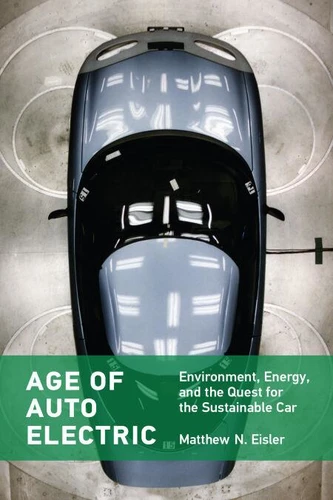Age of Auto Electric. Environment, Energy, and the Quest for the Sustainable Car
Par :Formats :
Disponible dans votre compte client Decitre ou Furet du Nord dès validation de votre commande. Le format ePub protégé est :
- Compatible avec une lecture sur My Vivlio (smartphone, tablette, ordinateur)
- Compatible avec une lecture sur liseuses Vivlio
- Pour les liseuses autres que Vivlio, vous devez utiliser le logiciel Adobe Digital Edition. Non compatible avec la lecture sur les liseuses Kindle, Remarkable et Sony
- Non compatible avec un achat hors France métropolitaine
 , qui est-ce ?
, qui est-ce ?Notre partenaire de plateforme de lecture numérique où vous retrouverez l'ensemble de vos ebooks gratuitement
Pour en savoir plus sur nos ebooks, consultez notre aide en ligne ici
- Nombre de pages378
- FormatePub
- ISBN978-0-262-37203-9
- EAN9780262372039
- Date de parution06/12/2022
- Protection num.Adobe DRM
- Taille523 Ko
- Infos supplémentairesepub
- ÉditeurThe MIT Press
Résumé
The electric vehicle revival reflects negotiations between public policy, which promotes clean, fuel-efficient vehicles, and the auto industry, which promotes high-performance vehicles. Electric cars were once as numerous as internal combustion engine cars before all but vanishing from American roads around World War I. Now, we are in the midst of an electric vehicle revival, and the goal for a sustainable car seems to be within reach.
In Age of Auto Electric, Matthew N. Eisler shows that the halting development of the electric car in the intervening decades was a consequence of tensions between environmental, energy, and economic policy imperatives that informed a protracted reappraisal of the automobile system. These factors drove the electric vehicle revival, argues Eisler, hastening automaking's transformation into a science-based industry in the process.
Challenging the common assumption that the electric vehicle revival is due to the development of better batteries, Age of Auto Electric instead focuses on changing environmental and socioeconomic conditions, energy and environmental policies, systems of energy conversion and industrial production, and innovation practices that affected the prevalence and popularity of electric vehicles in recent decades.
Eisler describes a world in transition from legacy to alternative energy-conversion systems and the promises, compromises, new problems, and unintended consequences that enterprise has entailed.
In Age of Auto Electric, Matthew N. Eisler shows that the halting development of the electric car in the intervening decades was a consequence of tensions between environmental, energy, and economic policy imperatives that informed a protracted reappraisal of the automobile system. These factors drove the electric vehicle revival, argues Eisler, hastening automaking's transformation into a science-based industry in the process.
Challenging the common assumption that the electric vehicle revival is due to the development of better batteries, Age of Auto Electric instead focuses on changing environmental and socioeconomic conditions, energy and environmental policies, systems of energy conversion and industrial production, and innovation practices that affected the prevalence and popularity of electric vehicles in recent decades.
Eisler describes a world in transition from legacy to alternative energy-conversion systems and the promises, compromises, new problems, and unintended consequences that enterprise has entailed.
The electric vehicle revival reflects negotiations between public policy, which promotes clean, fuel-efficient vehicles, and the auto industry, which promotes high-performance vehicles. Electric cars were once as numerous as internal combustion engine cars before all but vanishing from American roads around World War I. Now, we are in the midst of an electric vehicle revival, and the goal for a sustainable car seems to be within reach.
In Age of Auto Electric, Matthew N. Eisler shows that the halting development of the electric car in the intervening decades was a consequence of tensions between environmental, energy, and economic policy imperatives that informed a protracted reappraisal of the automobile system. These factors drove the electric vehicle revival, argues Eisler, hastening automaking's transformation into a science-based industry in the process.
Challenging the common assumption that the electric vehicle revival is due to the development of better batteries, Age of Auto Electric instead focuses on changing environmental and socioeconomic conditions, energy and environmental policies, systems of energy conversion and industrial production, and innovation practices that affected the prevalence and popularity of electric vehicles in recent decades.
Eisler describes a world in transition from legacy to alternative energy-conversion systems and the promises, compromises, new problems, and unintended consequences that enterprise has entailed.
In Age of Auto Electric, Matthew N. Eisler shows that the halting development of the electric car in the intervening decades was a consequence of tensions between environmental, energy, and economic policy imperatives that informed a protracted reappraisal of the automobile system. These factors drove the electric vehicle revival, argues Eisler, hastening automaking's transformation into a science-based industry in the process.
Challenging the common assumption that the electric vehicle revival is due to the development of better batteries, Age of Auto Electric instead focuses on changing environmental and socioeconomic conditions, energy and environmental policies, systems of energy conversion and industrial production, and innovation practices that affected the prevalence and popularity of electric vehicles in recent decades.
Eisler describes a world in transition from legacy to alternative energy-conversion systems and the promises, compromises, new problems, and unintended consequences that enterprise has entailed.



